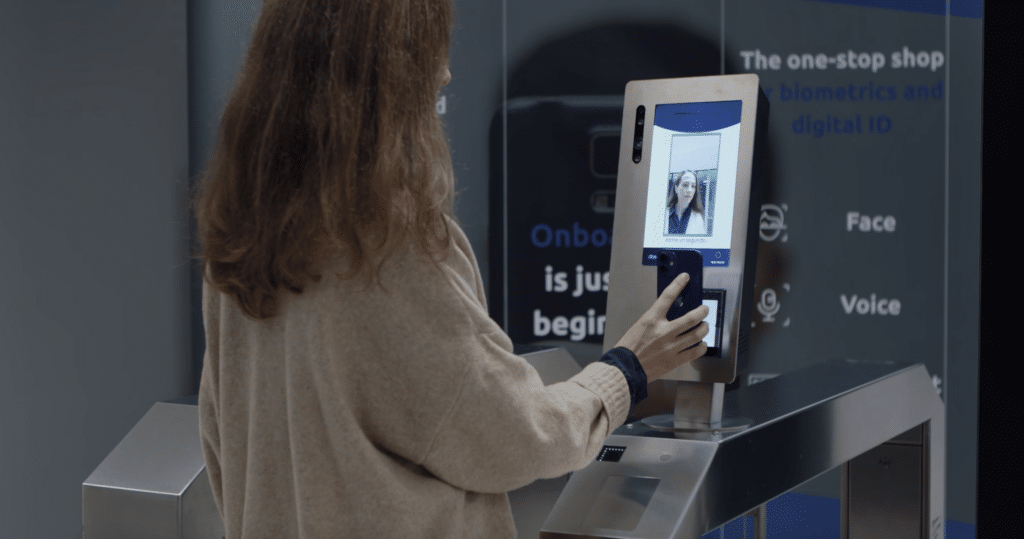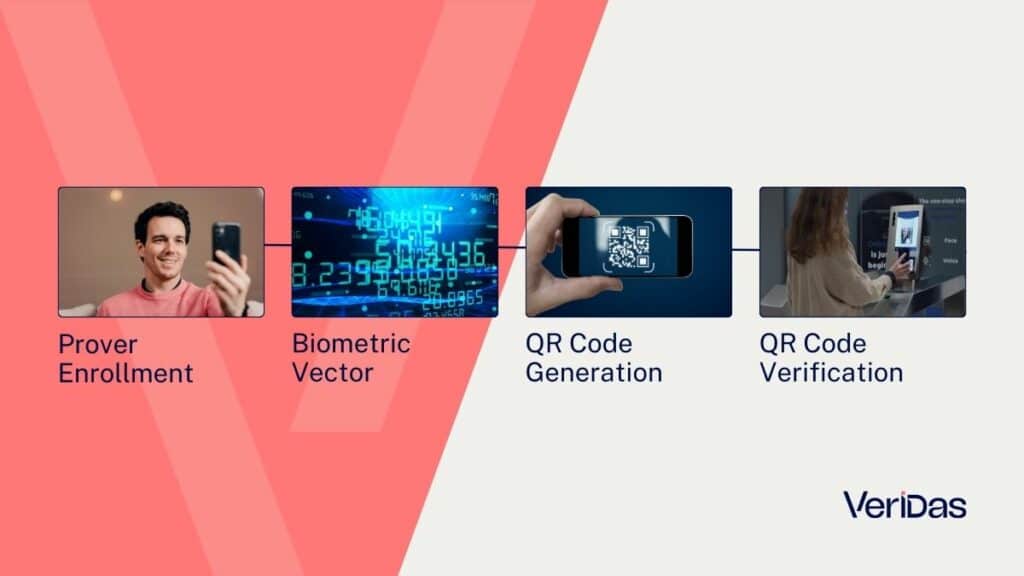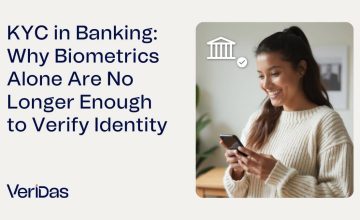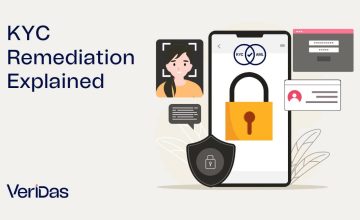A Zero Knowledge Proof (ZKP) is a cryptographic protocol that enables one party (the prover) to convince another party (the verifier) of the validity of a statement without revealing any additional information beyond the statement’s truthfulness.
In essence, it allows the prover to demonstrate knowledge of a certain fact or secret without divulging the actual content of that knowledge. This concept ensures privacy and confidentiality while still providing assurance of correctness.
In a ZKP interaction, the verifier can be convinced of the truth of a statement without obtaining any knowledge about the underlying data or computation process. This property makes ZKP invaluable in various fields, including biometric or blockchain technology, where it enables transactions to be validated without exposing sensitive information.
By adopting ZKP, parties can authenticate each other’s claims and transactions securely, enhancing trust and privacy in digital interactions.
In this article, we look at the key benefits of Zero-Knowledge Proof and how Veridas technology allows you to securely and confidentially verify user information through biometric systems.
What is zero-knowledge encryption?
Zero Knowledge Encryption (ZKE) is a sophisticated method in cryptography where data is securely encoded in a manner that allows for its verification without revealing any details about its content.
Unlike conventional encryption, where decryption keys are needed to unlock data, ZKE permits verification without any access to the actual information. This ensures the utmost confidentiality while still enabling data authentication.
ZKE finds extensive utility in scenarios where preserving data privacy is critical, like secure communication or data storage.
By leveraging ZKE, parties can exchange sensitive information with assurance, confident that their data remains shielded from prying eyes or unauthorized disclosure.

Zero-knowledge explained in examples
This is how Zero-knowledge works explained with the example of Veridas’ ZeroData ID technology:
Veridas’ ZeroData ID leverages ZKP by converting biometric data (such as a selfie) into an irreversible biometric vector. This vector, encrypted and embedded in a QR code, verifies identity without storing any sensitive data, ensuring user privacy and regulatory compliance.
The user scans the biometric QR code using a compatible device such as a facial reader, smartphone, or computer. Upon scanning, the biometric QR code is decrypted and its contents are extracted.
Veridas captures the user’s image and transforms in real-time it into a biometric vector, which is compared with the biometric vector stored within the QR code.
The device performs a 1:1 comparison to make a match. If the biometric data matches the stored biometric vector and the contextual information is validated, the user gains access to the desired service, location, or transaction.
How does zero knowledge proof work?
Zero Knowledge Proof (ZKP) is like proving you can solve a puzzle without revealing the solution. Imagine you have a friend who claims they can unlock any combination lock. Instead of showing the combination, they ask you to set a lock and then, without seeing the combination, they unlock it. You can confirm they unlocked it, but you still don’t know the combination. In this scenario, your friend proves their skill without revealing the secret.
In the digital world, ZKP works similarly. For instance, in a password authentication system, instead of transmitting the password itself, a ZKP protocol allows a user to prove they know the password without actually sharing it. This way, the system can verify the user’s identity without exposing the password to potential eavesdroppers. ZKP ensures privacy and security while still enabling authentication, making it a powerful tool in cybersecurity and cryptography.

Types of Zero Knowledge Proof
Zero-Knowledge Proofs (ZKPs) come in various types, each with its own way of demonstrating knowledge without revealing information.
- Interactive Zero-Knowledge Proofs: In a scenario like a shell game, where a friend hides a ball under one of three cups, and by choosing cups repeatedly and having your friend reveal them empty, you convince yourself of the location of the ball without your friend ever showing it. This interactive process demonstrates zero-knowledge.
- Non-Interactive Zero-Knowledge Proofs: Imagine a sealed box containing a solved puzzle, and you claim you solved it without opening the box. Presenting the sealed box, a third party verifies your claim without seeing the puzzle’s solution. This demonstrates zero-knowledge without interaction.
In digital identity verification, these types of zero-knowledge proofs enable users to authenticate themselves without revealing sensitive information, ensuring secure transactions and privacy.
Benefits of Zero-Knowledge Proofs
By allowing verification without full disclosure, ZKPs offer enhanced privacy, improved security, and increased trust in digital transactions. This innovative approach has gained significant attention across various industries, including cybersecurity, blockchain technology, and data privacy, due to its potential to revolutionize how sensitive information is handled and authenticated in digital environments.
- Enhanced Privacy: ZKPs enable individuals to prove knowledge or possession of information without revealing the actual data, thus preserving privacy.
- Improved Security: By allowing authentication and verification without transmitting sensitive data, ZKPs reduce the risk of data breaches and unauthorized access.
- Increased Trust: ZKPs provide verifiable proof of identity or credentials without full disclosure, fostering trust in online transactions and communications.
- Regulatory Compliance: ZKPs help organizations comply with privacy regulations by minimizing the exposure of personal data, aligning with data protection requirements.
- Efficient Authentication: ZKPs streamline authentication processes by providing a secure and efficient method to prove identity or ownership without extensive data sharing.
- Versatility: ZKPs can be applied across various use cases, including blockchain, authentication systems, and secure communication channels, offering versatility in enhancing security and privacy.
Zero-Knowledge Proof Use Cases
Zero-Knowledge Proofs enable individuals to prove specific attributes or qualifications while maintaining the privacy of sensitive information, enhancing security and trust in digital identity verification processes.
- Biometric Authentication: Zero-Knowledge Proofs can be used to verify biometric data such as facial or voice recognition without exposing the raw biometric information. For example, a user can prove they possess a valid face for authentication purposes without revealing the face itself.
- Password Authentication: Instead of transmitting passwords over a network, users can prove their knowledge of the password using a Zero-Knowledge Proof. For instance, a user can demonstrate they know their password without revealing the password itself when logging into an online account.
- Age Verification: In scenarios where age verification is required, individuals can prove they are above a certain age without disclosing their exact birthdate. For instance, a person can demonstrate they are over 18 years old to access age-restricted content without revealing their birthdate.
- KYC Compliance: Zero-Knowledge Proofs can facilitate Know Your Customer (KYC) compliance in financial services without sharing sensitive personal information. For example, individuals can prove they meet KYC requirements, such as residency or citizenship, without revealing their full address or national identity number.
- Credential Verification: Zero-Knowledge Proofs can be used to verify credentials such as educational degrees or professional certifications without disclosing the specific details of the qualifications. For instance, a job applicant can prove they hold a relevant degree without revealing the exact institution or graduation year.
Zero Knowledge proof vs Zero Trust
Zero Knowledge Proof (ZKP) and Zero Trust are two distinct concepts in the realm of cybersecurity, albeit with some similarities.
ZKP is a cryptographic protocol that allows one party to prove the validity of a statement to another party without revealing any additional information beyond the truthfulness of the statement. It ensures privacy and confidentiality while providing assurance of correctness, commonly used in authentication processes where one party needs to verify identity without sharing sensitive data.
On the other hand, Zero Trust is a security framework that assumes no entity, whether inside or outside an organization’s network, should be trusted by default. Instead of relying on a perimeter-based security model, Zero Trust requires continuous verification of every entity’s identity and device, regardless of their location or network access. It enforces strict access controls and least privilege principles, treating every access attempt as potentially malicious until proven otherwise.
While ZKP focuses on proving statements without revealing information, Zero Trust focuses on continuously verifying and validating identities and access attempts. Both concepts aim to enhance security and privacy in digital environments, albeit through different approaches and mechanisms.
How to implement zero knowledge proof?
Implementing Zero-Knowledge Proofs (ZKPs) involves several key steps to ensure the secure and efficient verification of information without revealing sensitive data. First, define the statement to be proved and choose an appropriate cryptographic protocol for the ZKP. This could involve selecting an interactive or non-interactive ZKP depending on the application.
Next, determine the underlying mathematical problem or cryptographic primitive that will serve as the basis for the proof. Common primitives include discrete logarithms, elliptic curve pairings, or hash functions. Then, design the ZKP protocol to demonstrate knowledge of a solution to the chosen problem without revealing the solution itself.
Develop algorithms and procedures for the prover and verifier to interact securely. This includes generating cryptographic commitments, constructing proofs, and verifying their validity. Implement these algorithms using secure programming practices and cryptographic libraries.
Test the implementation thoroughly to ensure correctness, security, and efficiency. This may involve simulated interactions between the prover and verifier, as well as rigorous analysis of computational complexity and security properties.
Finally, deploy the ZKP implementation in the desired application environment, ensuring that it integrates seamlessly with existing systems and processes. Monitor its performance and security over time, and update as necessary to address any vulnerabilities or performance issues. With careful planning and implementation, Zero-Knowledge Proofs can be effectively deployed to enhance privacy and security in various digital applications.
FAQs on Biometric Verification with Zero-Knowledge Proofs
1What does biometric verification with zero-knowledge proofs mean?
It’s a way to confirm identity using biometrics without exposing raw data, through cryptographic proofs.
Biometric verification with zero-knowledge proofs (ZKPs) allows an individual to confirm their identity without exposing raw biometric data. Advanced mathematical algorithms prove authenticity without revealing the sensitive information itself, such as a face or voice template.
What is the main purpose of a zero-knowledge proof?
To prove a claim is true without revealing the sensitive data behind it.
The main purpose of a zero-knowledge proof is to demonstrate that a statement is true without disclosing the underlying data. In digital identity, this means a person can prove who they are without handing over sensitive biometric or document information.
What advantages does combining biometrics and ZKPs bring to the market?
It ensures privacy, regulatory compliance, fraud resistance, and stronger user trust.
The combination enhances privacy protection, ensures compliance with GDPR and the EU AI Act, strengthens resistance against fraud (deepfakes, spoofing, identity theft), and builds user trust. It also addresses growing demand for secure, privacy-preserving identity solutions across industries.
How are these solutions different from traditional biometrics?
They use irreversible, revocable biometric references instead of fixed, reusable templates.
Traditional biometrics rely on fixed templates that may be reused or compromised. Modern biometrics with ZKPs and Renewable Biometric References (RBRs) generate irreversible, revocable, and context-specific representations. This makes them impossible to reconstruct, strengthening both privacy and security.
Which industries are adopting biometric solutions with ZKPs?
Banking, telecoms, government, insurance, and mobility are leading adopters.
Key adopters include banking and fintech for secure onboarding, telecommunications for customer verification, public administrations for digital ID programs, insurance for remote authentication, and mobility sectors for physical access control. These industries value the balance of security, compliance, and user experience.
What role does Veridas play in this market?
Veridas provides RBR- and ZeroData-based biometric solutions recognized by EU regulators.
Veridas develops modern biometric solutions based on RBRs and ZeroData ID technology, ensuring biometric data is never exposed or reused. Its solutions have been recognized by institutions such as the Spanish National Cryptology Center and align with European AI and data protection regulations.
7. How is regulatory compliance ensured in these solutions?
They follow GDPR, EU AI Act, BIPA, and other laws, with independent audits and ISO/NIST certifications.
Solutions are designed to comply with global frameworks such as GDPR in Europe, the EU AI Act, Mexico’s Federal Law on Data Protection, and BIPA in the United States. Independent audits and certifications (ISO, NIST, iBeta) reinforce transparency, accountability, and trust.







